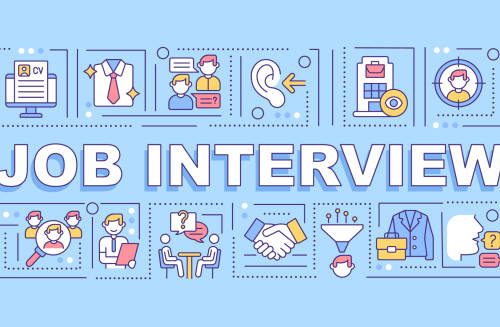Interview worries

Source: https://www.simplilearn.com/job-interview-statistics-article
“I’m so nervous” I thought to myself as I walked towards the Peter Froggatt building on the morning of my simulated interview. I do not like interviews (who does?) as they make me very nervous as I’m always worried, What if I say the wrong thing? I never know what to wear, I think I wore a suit and tie for my first job interview at a retail store, which in hindsight was maybe a bit much. Which is why preparation was really important for me for this interview, I wanted to make sure I had all the information in my head to be able to answer any question that was asked of me.

Source: https://www.toolshero.com/personal-development/borton-model-of-reflection/
In this blog post I will be making use of Terry Bortons model of reflection, which can be best summarised as asking the questions: What?> So what?> Now what? This approach allows me to take a more practical approach to my reflection, first discussing my experiences, expanding on what I felt about them and then elaborating further by talking about what those experiences have changed for me and what I intend to do moving forward.
The Job role I applied for was “Live Webcasting Project Manager/ Production Coordinator.” When I was searching around online for the type of job, I wanted to apply for I was not really sure, but this one caught my eye. I am currently completing work placement at the Sonic Arts Research Centre video team at Queens University, which means I am part of a team that helps set up and record live music performances at Queens University that go out every week as a livestream. Over the duration of this module, I realised this was something I might actually like to do for a living, so when I seen this job listing, I thought it would be perfect for me. As it would allow me to work in the world of livestreaming and also take a step up into management.

Source: https://www.forbes.com/sites/lizryan/2018/03/13/ten-ways-to-get-over-your-fear-of-interviews/
There were various aspects of the interview process that I was worried about, none more so than knowing what to talk about. I never know when to talk more about my personal or professional life, and I do not want to talk too much about one subject, as is stated by Martha Kompter (1991. 26):
the relation between what is said and what is left implicit is not haphazard. The social skills of conversationalists depend to a large extent on a sensitivity for what to say and what to leave implicit, and on the ability to interpret the implied meanings of their conversational partners
But this interview gave me the chance to work on my conversation skills and learn what kind of answers I should be giving to certain questions in an interview setting. Now going forward I will be more prepared for talking about my own experiences in job interviews. Another aspect I was worried about for the simulated interview was the prospect of being interviewed by multiple people, in any job interview I have had in the past it has just been one on one. But this interview would involve me being asked several questions by different people. In the end this worked to my benefit I believe as it meant I was not just talking to one person the whole time I could split my eye contact between multiple people and didn’t feel intimidated as I did not have to worry about focusing too much on one person I could relax and have a more open conversation.

Source: https://www.wisebread.com/13-ways-to-make-a-good-first-impression-at-your-next-job-interview
I believe the interview went well, having seen my peer feedback from my classmates who conducted the interview, I think I have some room for improvement but gave a good account of myself in the interview. I believe that I did a good job at relating my skills and experience to the job role, given that I have experience in this area with my work placement I was able to give various examples of my experience and how I would fare in many scenarios that I might face in the job. I believe I presented myself well and portrayed positive body language throughout the interview, for these various aspects I was rated quite highly by my peers. Their feedback was very important to me as they were going through their simulated interviews as well so they were likely experiencing the same feelings I was having and having that kind of validation from people who were going to be doing the same thing as me meant a lot.
To conclude, this interview process taught me a lot, it gave me valuable experience in not just interviewing for a job in my chosen field, but in interviews as a whole. It helped me get more practice at relating my own experiences to the questions the interviewer was asking me. It also gave me more confidence in talking about myself and trying to sell myself in order to convince the person hiring me that I am the right person for the job.

Bibliography
Komter, Martha. 1991, Conflict and Cooperation in Job Interviews : A study of talks, tasks and ideas, John Benjamins Publishing Company, Amsterdam. Available from: ProQuest Ebook Central. [22 February 2023].
You May Also Like

BE A S.T.A.R 🌟
14 February 2023
Interview a New You! – Becoming an Interview Guru
24 February 2023
